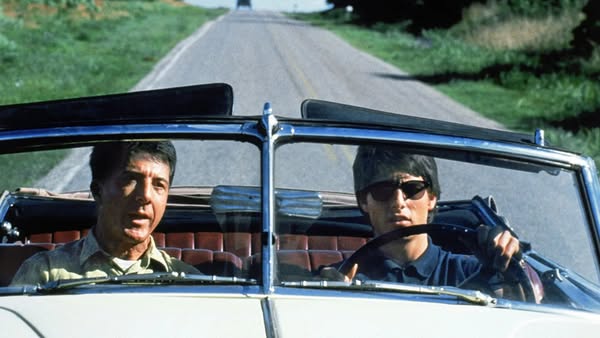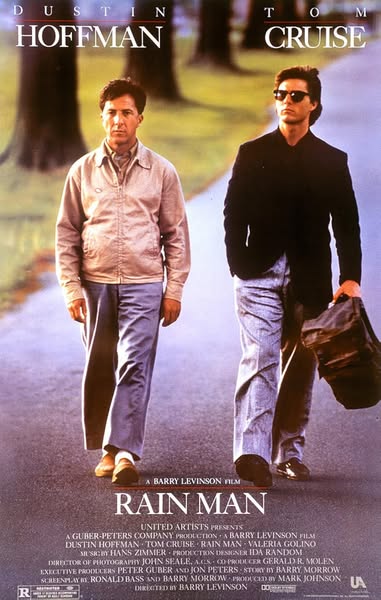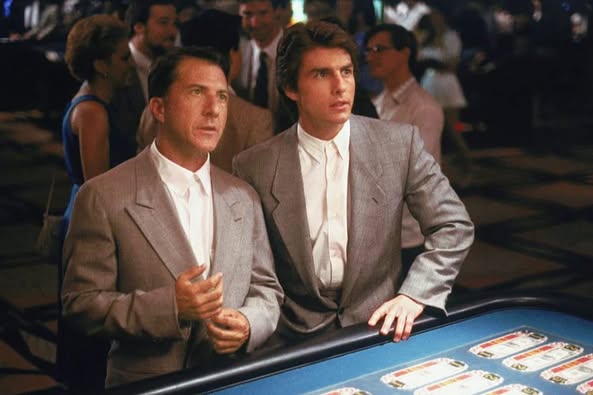Rain Man (1988)

Rain Man is a groundbreaking film released in 1988, directed by Barry Levinson and featuring powerful performances by Dustin Hoffman and Tom Cruise. The film explores themes of family, disability, and the complexities of human relationships, making it a poignant and impactful drama that resonates with audiences even decades after its release.
The story centers around Charlie Babbitt (Tom Cruise), a fast-talking, self-centered car dealer whose life is turned upside down when he learns that his estranged father has passed away. Upon his father’s death, Charlie discovers that he has an older brother, Raymond (Dustin Hoffman), whom he never knew existed. Raymond is an autistic savant with a remarkable ability to calculate numbers but struggles with social interactions and communication. When Charlie learns that he is not set to inherit his father’s fortune, he decides to take Raymond from the care facility where he has lived most of his life, hoping to gain control of the inheritance.

As the brothers embark on a cross-country road trip, the film delves into their evolving relationship. Initially, Charlie is frustrated by Raymond’s quirks and routines, but as they travel together, he begins to understand and appreciate his brother’s unique perspective on life. The journey serves as a catalyst for Charlie’s personal growth, forcing him to confront his own flaws and reassess what truly matters in life.

Dustin Hoffman’s portrayal of Raymond is both sensitive and nuanced, earning him an Academy Award for Best Actor. His performance highlights the challenges faced by individuals with autism while also showcasing their extraordinary talents. Tom Cruise complements Hoffman’s performance with a compelling portrayal of Charlie, capturing his transformation from a self-absorbed businessman to a more empathetic and caring brother. The chemistry between the two actors is central to the film’s emotional impact, as they navigate the complexities of their relationship.
Barry Levinson’s direction is both thoughtful and engaging, balancing moments of humor with deeper emotional stakes. The screenplay, written by Ronald Bass, offers a rich exploration of the characters’ inner lives, blending heartwarming moments with poignant insights into the nature of family and acceptance. The film’s pacing allows for both character development and plot progression, keeping viewers invested in the brothers’ journey.

Rain Man also features a memorable score by Hans Zimmer, whose music enhances the film’s emotional resonance. The themes of the score reflect the film’s blend of humor and drama, underscoring key moments and adding depth to the narrative.
Upon its release, Rain Man received critical acclaim and was a commercial success, grossing over $350 million worldwide. It won four Academy Awards, including Best Picture, Best Director, Best Actor for Hoffman, and Best Original Screenplay. The film not only brought attention to autism but also sparked conversations about the representation of individuals with disabilities in media.
In conclusion, Rain Man is a powerful and thought-provoking film that explores the complexities of family bonds and the challenges of living with autism. With outstanding performances from Dustin Hoffman and Tom Cruise, combined with Barry Levinson’s insightful direction, the film offers a heartfelt narrative that remains relevant today. Its exploration of acceptance, love, and personal growth makes Rain Man a timeless classic, leaving a lasting impression on audiences and contributing to a greater understanding of autism and its nuances.











